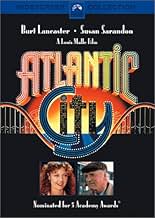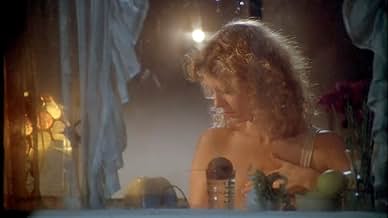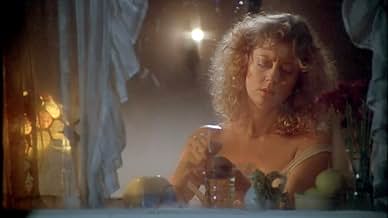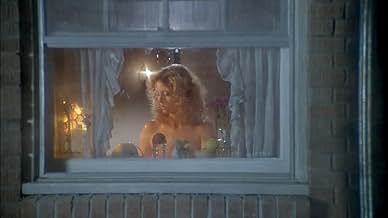IMDb-BEWERTUNG
7,3/10
19.181
IHRE BEWERTUNG
Füge eine Handlung in deiner Sprache hinzuIn a corrupt city, a small-time gangster and the estranged wife of a pot dealer find themselves thrown together in an escapade of love, money, drugs and danger.In a corrupt city, a small-time gangster and the estranged wife of a pot dealer find themselves thrown together in an escapade of love, money, drugs and danger.In a corrupt city, a small-time gangster and the estranged wife of a pot dealer find themselves thrown together in an escapade of love, money, drugs and danger.
- Für 5 Oscars nominiert
- 25 Gewinne & 22 Nominierungen insgesamt
Wallace Shawn
- Waiter
- (as Wally Shawn)
Empfohlene Bewertungen
10Joel I
ATLANTIC CITY is one of those perfect little movies in which writing, direction, acting, and setting all come together seamlessly. The story is a subtle and wistful blending of comedy and drama that is both true to life and touching. There is great resonance between the characters' situations and the mood of Atlantic City, beautifully captured at a pivotal time in its history. Burt Lancaster gives one of the great performances of all time and really should have won the Oscar. Susan Sarandon is also superb, and their scenes together are unforgettable. Kate Reid as a faded gangster's moll is a standout in the fine supporting cast. This is perhaps Louis Malle's finest movie, and, in my opinion, one of the 10 best movies of the 80s.
This is a little bit on the seedy side but it's well-done and Burt Lancaster, once again, provides us with a wonderful character study. This time he's "Lou Pascal," an old-time small hood playing out his days in pathetic manner in a dingy Atlantic City. In fact, "seedy" describes Atlantic City in this picture.
There's nothing seedy about the opening scene, however. It's an attention- grabber, at least if you're a male. We see Susan Sarandon, squeezing lemon juice over her breasts at the kitchen window. Later, we see her do the same thing.
The film is no lemon, however. It's an excellent film and Lancaster, Sarandon ("Sally Matthews") and her husband "Dave" (Robert Joy) comprise most the early going. Joy's role as Sally's loser druggie husband was ugly but he doesn't last long in the film.
The second half of the film features mostly the two stars, both of whom were up for Academy Awards for their performance (and lost out in a sentimental vote for the On Golden Pond crowd). Not only do Lancaster and Sarandon excel, but so does director Louis Malle.
Malle makes this almost a modern-day film noir with the grittiness of the characters and the setting, when Atlantic City looked its worst. It's just solid film-making all-around, and few people could play intense characters, young or old, as well as Lancaster.
My only regret is the transfer on the DVD. It's a little grainy and this film deserves better treatment. although, come to think of it - the grain is appropriate considering it's a gritty story.
There's nothing seedy about the opening scene, however. It's an attention- grabber, at least if you're a male. We see Susan Sarandon, squeezing lemon juice over her breasts at the kitchen window. Later, we see her do the same thing.
The film is no lemon, however. It's an excellent film and Lancaster, Sarandon ("Sally Matthews") and her husband "Dave" (Robert Joy) comprise most the early going. Joy's role as Sally's loser druggie husband was ugly but he doesn't last long in the film.
The second half of the film features mostly the two stars, both of whom were up for Academy Awards for their performance (and lost out in a sentimental vote for the On Golden Pond crowd). Not only do Lancaster and Sarandon excel, but so does director Louis Malle.
Malle makes this almost a modern-day film noir with the grittiness of the characters and the setting, when Atlantic City looked its worst. It's just solid film-making all-around, and few people could play intense characters, young or old, as well as Lancaster.
My only regret is the transfer on the DVD. It's a little grainy and this film deserves better treatment. although, come to think of it - the grain is appropriate considering it's a gritty story.
"Atlantic City" is the movie wherein my crush on Susan Sarandon (and her figure) reached full flower. She is klutzy, strong-willed, and hopeful as an aspiring casino dealer at the dawn of Las Vegas East. Burt Lancaster gives a heart-rending performance as a two-bit crook who has simply outlived all the real thugs. It was like watching a mighty oak refuse to shed its last few tender leaves before succumbing to the frigid indifference of Winter. Louis Malle keeps the movie moving along amiably, and the few weak points (the ex-husband, occasional overacting by SS, some viewers may also find BL a bit hammy for their tastes) are not particularly dire. The film evokes the spirit of the great film noirs of the 1940s and 1950s. Think Coen Bros. served with a thick glaze of sentimentality. Comic yet poignant, "Atlantic City" is one of the Best Films of the Eighties (says I).
"Tutti-frutti ice cream and craps don't mix."
"Tutti-frutti ice cream and craps don't mix."
Set in 1970s Atlantic City in the early days of legalized gambling, we find a young woman (Susan Sarandon) working in the fish section of a casino restaurant while learning to be a card dealer. At the same time, an elderly, small-time hood (Burt Lancaster) is stuck taking care of a gangster's widow (Kate Reid). Sarandon's husband and her younger sister ran off together and unexpectedly reappear looking for a place to stay. Her sister is now pregnant and her low-life husband is trying to sell drugs stolen from a big-time dealer in Philadelphia. Sarandon's husband meets Lancaster in a bar while trying to set up a deal to sell the drugs, and he convinces Lancaster to be his "mule." Lancaster and Sarandon being neighbors -- with her brother in law as the mutual acquaintance -- are brought together and become involved in more trouble than they ever thought imaginable.
The refreshing aspect of this motion picture is that it avoids the typical Hollywood pitfall where character development and dialogue play second fiddle to car chases and stunt scenes. In Atlantic City the odious characters and sticky situations are secondary to the development/relationships of the lead characters. This is the first excellent performance on film of a young Sarandon, and one of the finest performances of Lancaster's distinguished career.
This film has been butchered on cable, VHS, and laserdisc. Please let's have a quality remaster on DVD in widescreen format.
The refreshing aspect of this motion picture is that it avoids the typical Hollywood pitfall where character development and dialogue play second fiddle to car chases and stunt scenes. In Atlantic City the odious characters and sticky situations are secondary to the development/relationships of the lead characters. This is the first excellent performance on film of a young Sarandon, and one of the finest performances of Lancaster's distinguished career.
This film has been butchered on cable, VHS, and laserdisc. Please let's have a quality remaster on DVD in widescreen format.
Louis Malle, his cast, and his location really put this one over. It's well above the routine. Malle knows how to tell a story conventionally, without screaming shock effects or outsize explosions or in-your-face directorial banner headlines. When a pistol is fired, it doesn't boom like dirty Harry's. It simply pops unobtrusively. It all flows along smoothly. And it's aptly titled. The story is as much about Atlantic City as it is about the residents and visitors we meet. It's like a Robert Altman movie except that it has a fascinating narrative that draws us in.
We see the city first. A decrepit faux urban setting whose good days are long in the past. (Woodrow Wilson used to summer nearby.) It was called "the lungs of Philadelphia." It boomed as a summer resort before commercial airlines vulgarized travel and brought Miami and Bermuda within easy temporal reach of the Northeast corridor. The older apartment buildings, the ones with Queen Anne towers, are being demolished, to be replaced by the casinos that everyone assumes will bring prosperity back. (They never did. The money stayed in the casinos or went out of state.) But those sturdy old brick palaces were built to last and the apartments we see are shabby but cozy too. People have made nests in them over the years. The residents have accomodated their existences to the frames of the places they live in. People work in oyster bars, or run numbers in the falling-apart rubbish-strewn black neighborhoods. They can, if they have the money to do so, dine in reasonably good restaurants or stroll on the boardwalks, and we can almost hear the hoofbeats of yesteryear.
What modern Atlantic City is to its brassy past, Burt Lancaster is to his own history. He stalks the streets in his overcoat, wearing the only tie he owns, mutters things about how important he used to be, once having shared a cell with Bugsy Siegal. He used to have to kill people once in a while, he tells a young man confidentially. He always felt bad about it afterward and used to take a long swim in the ocean to feel clean again. "I never saw the Atlantic Ocean until today," says the kid. Lancaster turns around and looks out to sea and waves expansively. "You should of seen the ocean then," he says. "The Atlantic Ocean was really somethin' in them days." His glorious career, it turns out, has about the same epistemological status as that of the city he hasn't been outside of for the past twenty years. The Atlantic Ocean was really somethin' in them days. What a line! And Lancaster handles it well too. He's no Crimson Pirate here, just a quiet older guy with curly white hair trying to make a buck by running errands for small-time hoods, and trying to sell a silver cigarette case, a memento of his past, for "a double sawbuck." He looks exactly right too. Not "old," exactly, but well aged, like a mature burgundy. His generously featured face hasn't drooped with the passage of the years. His eyebrows are dark and set off his surprisingly gentle eyes. He doesn't clip off the terminal contours of his sentences, as he did before. It's a splendid performance.
His performance is matched by that of the other principle actors. There are some quietly amusing episodes between him and the woman he takes care of. (There is also a pretty gruesome lethal stabbing, although without blood.) Only the villains are one-dimensional villains. Susan Sarandon is marvelous as the young oyster-bar employee who wants to become a casino dealer, even if it means putting up with hits from the oily French guy who teaches the fine art of dealing in a school run by the casinos. He smokes with a cigarette holder and sounds like Charles Boyer, the swine. What a fine actress she is. Even here, dressed in threadbare clothes, her skirts around her ankles, wearing clumsy boots, her hair a mop of Scottish red, she fixes a viewer's interest when she's on the screen. She's as vulnerable under those oyster shells as Lancaster is when he discovers he can't protect her from the villains. And the two of them have a tender love scene together, and later a more raucous good time. In the end they go their separate ways -- Lancaster back to his destiny, and Sarandon in search of hers.
The characters in the film bounce around at first, at odds with one another, or simply unaware of the others' presence, but Malle draws them together into a community whose welfare we finally come to care about. It's a fine movie.
We see the city first. A decrepit faux urban setting whose good days are long in the past. (Woodrow Wilson used to summer nearby.) It was called "the lungs of Philadelphia." It boomed as a summer resort before commercial airlines vulgarized travel and brought Miami and Bermuda within easy temporal reach of the Northeast corridor. The older apartment buildings, the ones with Queen Anne towers, are being demolished, to be replaced by the casinos that everyone assumes will bring prosperity back. (They never did. The money stayed in the casinos or went out of state.) But those sturdy old brick palaces were built to last and the apartments we see are shabby but cozy too. People have made nests in them over the years. The residents have accomodated their existences to the frames of the places they live in. People work in oyster bars, or run numbers in the falling-apart rubbish-strewn black neighborhoods. They can, if they have the money to do so, dine in reasonably good restaurants or stroll on the boardwalks, and we can almost hear the hoofbeats of yesteryear.
What modern Atlantic City is to its brassy past, Burt Lancaster is to his own history. He stalks the streets in his overcoat, wearing the only tie he owns, mutters things about how important he used to be, once having shared a cell with Bugsy Siegal. He used to have to kill people once in a while, he tells a young man confidentially. He always felt bad about it afterward and used to take a long swim in the ocean to feel clean again. "I never saw the Atlantic Ocean until today," says the kid. Lancaster turns around and looks out to sea and waves expansively. "You should of seen the ocean then," he says. "The Atlantic Ocean was really somethin' in them days." His glorious career, it turns out, has about the same epistemological status as that of the city he hasn't been outside of for the past twenty years. The Atlantic Ocean was really somethin' in them days. What a line! And Lancaster handles it well too. He's no Crimson Pirate here, just a quiet older guy with curly white hair trying to make a buck by running errands for small-time hoods, and trying to sell a silver cigarette case, a memento of his past, for "a double sawbuck." He looks exactly right too. Not "old," exactly, but well aged, like a mature burgundy. His generously featured face hasn't drooped with the passage of the years. His eyebrows are dark and set off his surprisingly gentle eyes. He doesn't clip off the terminal contours of his sentences, as he did before. It's a splendid performance.
His performance is matched by that of the other principle actors. There are some quietly amusing episodes between him and the woman he takes care of. (There is also a pretty gruesome lethal stabbing, although without blood.) Only the villains are one-dimensional villains. Susan Sarandon is marvelous as the young oyster-bar employee who wants to become a casino dealer, even if it means putting up with hits from the oily French guy who teaches the fine art of dealing in a school run by the casinos. He smokes with a cigarette holder and sounds like Charles Boyer, the swine. What a fine actress she is. Even here, dressed in threadbare clothes, her skirts around her ankles, wearing clumsy boots, her hair a mop of Scottish red, she fixes a viewer's interest when she's on the screen. She's as vulnerable under those oyster shells as Lancaster is when he discovers he can't protect her from the villains. And the two of them have a tender love scene together, and later a more raucous good time. In the end they go their separate ways -- Lancaster back to his destiny, and Sarandon in search of hers.
The characters in the film bounce around at first, at odds with one another, or simply unaware of the others' presence, but Malle draws them together into a community whose welfare we finally come to care about. It's a fine movie.
Wusstest du schon
- WissenswertesJust after filming ended Burt Lancaster nearly died during a routine gall bladder operation in January 1980, requiring multiple blood transfusions.
- PatzerNear the end of the film Grace tells Chrissie that they'd both lost their men to a shooting. But Chrissie's man was stabbed, not shot.
Chrissie didn't know that. If she didn't know, a Goof can't be charged against her.
- Crazy CreditsAs the end credits roll, an old building on the boardwalk is demolished to some of the tunes that appear earlier in the film. Each time the wrecking ball hits, we hear a cymbal crash and the soundtrack jumps to a different song.
Top-Auswahl
Melde dich zum Bewerten an und greife auf die Watchlist für personalisierte Empfehlungen zu.
- How long is Atlantic City?Powered by Alexa
Details
- Erscheinungsdatum
- Herkunftsländer
- Sprachen
- Auch bekannt als
- Atlantic City
- Drehorte
- Produktionsfirmen
- Weitere beteiligte Unternehmen bei IMDbPro anzeigen
Box Office
- Budget
- 7.200.000 $ (geschätzt)
- Bruttoertrag in den USA und Kanada
- 12.729.675 $
- Weltweiter Bruttoertrag
- 12.729.675 $
Zu dieser Seite beitragen
Bearbeitung vorschlagen oder fehlenden Inhalt hinzufügen

































